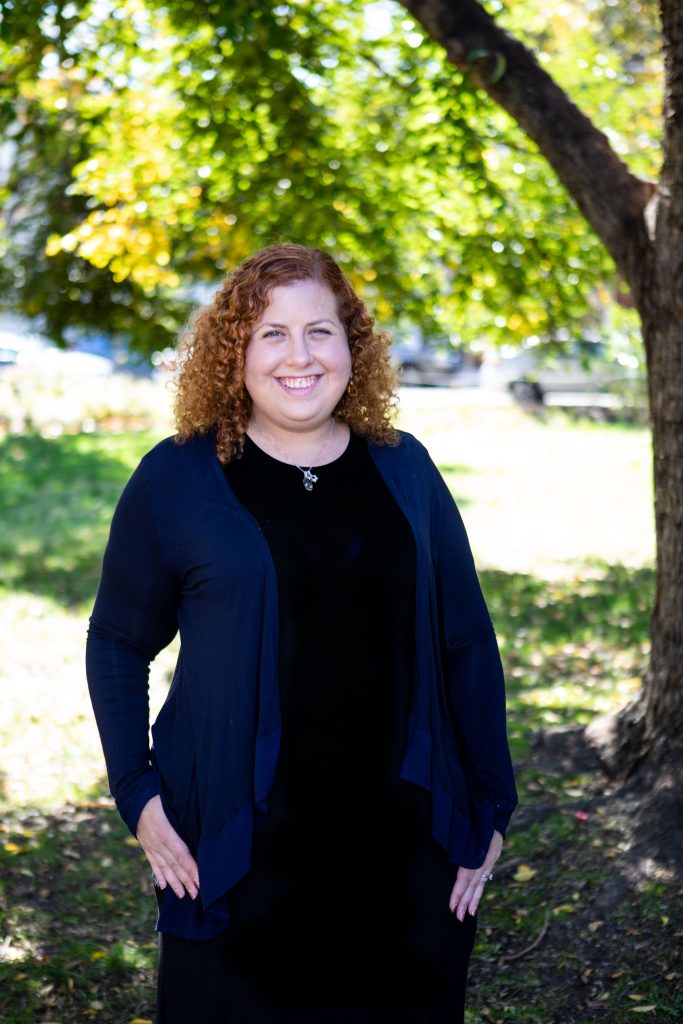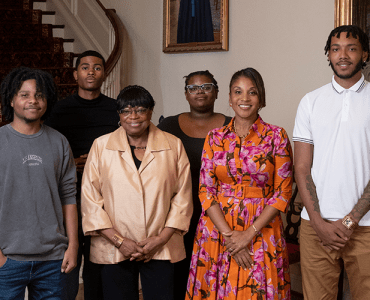
The University of Maryland, Baltimore’s (UMB) core values are woven into much of the work the University does on campus, in the community, and even globally. Over the years, UMB has emphasized the importance of its core values with a monthlong celebration in April for Core Values Month, awards given to employees and students who exemplify the core values, a Core Values Speaker Series, and the Core Values Commitment Pledge. Employees, students, and visitors alike see the core values — Respect and Integrity, Well-Being and Sustainability, Equity and Justice, and Innovation and Discovery — displayed on banners and signs all around campus.
And now, UMB for the first time has created a position to lead the efforts to champion the core values.
Stacey Rose, EdD, MEd, MSW, has joined UMB as the inaugural core values program director. Rose comes to the University from the U.S. Military Academy in West Point, N.Y., where she was the acting lead sexual assault response coordinator and alternate SHARP (sexual harassment/assault, response, and prevention) program manager. Her goal was to reduce the prevalence of sexual violence among West Point cadets by implementing educational programs designed to increase cadet knowledge and skills within the areas of bystander intervention, healthy relationship skills, and establishing positive norms about gender and sexuality.
Parts of the trainings she performed at West Point included emphasizing that Army professionals must ground themselves within the Army Values.
She previously was education and training manager, training coordinator, and teen council coordinator for Planned Parenthood of Delaware from 2016 to 2019.
Among her achievements, she has been the recipient of the Civilian Service Commendation Medal in 2023 and the Meritorious Civilian Service Award in 2022.
Rose holds a Bachelor of Arts degree in religious studies from Wells College, a Master of Education in human sexuality and a Master of Social Work from Widener University, and a Doctor of Education in leadership and innovation from New York University.
UMB President Bruce E. Jarrell, MD, FACS, said of Rose’s hiring, “Our core values demonstrate what we stand for and serve as a guide to how we behave. I’m pleased that Dr. Rose has joined UMB as our inaugural core values director and am glad she will use her expertise to continue to embed our core values throughout the institution.”
Get to know Rose and her goals for the core values in the following question-and-answer.
How do you envision your background helping you in your new role as core values director?
I have worked in a variety of types of organizations from for-profit to nonprofit, government, and higher ed, and one of the commonalities is that the people within an organization are what matters. I have done a lot of personal and professional development to listen for what is wanted and to be part of the solution. As the core values director, my job is to listen to the people who have already been doing great work in having UMB be constituted by its core values, supporting their existing efforts while driving new initiatives forward.
How did you work with cadets at West Point on the Army Values?
In my role within the SHARP program, I was focused on the prevention of and response to sexual violence. Most of that work focused on the values of integrity — are we who we say we are? — and respect — are we treating others not only how we want to be treated (“the golden rule”), but how they want to be treated (“the platinum rule”)? In my role, I did a lot of education and had a lot of conversations around supporting cadets to examine for themselves the questions “Who am I?”, “Who do I want to be?”, and “Where are the areas of growth to get from who I am to who I want to be?”
What was your impression of UMB’s core values when you first heard what they are and mean?
It was heartening to see an institution doing the work to look at what really mattered in who they wanted to be as an organization not only right now but going forward. The fact that they were going to hire an individual to support the organization in being constituted by the values they determined were at the core of the institution rather than patting themselves on the back saying “OK, we have the core values, we’re good” said to me that UMB was a place I wanted to be. Especially because the core values are values I have for myself.
At my core, I want to live in a world where people are accepted and loved for who they are. I want to be able to read current events and be filled with joy about the ways people are caring for one another rather than the current sense of dread over who has been harmed today for trying to exist. There is a Jewish teaching around healing the world that says something to the effect of “You are not required to finish the work, but neither are you free to desist from it.” I feel a personal obligation to be part of the solution to creating the world I want to live in. At the heart of that is UMB’s core value of Respect and Integrity, closely tied into the core value of Equity and Justice. There are a lot of systems that have been built to maintain the status quo of the world, and looking for equitable solutions to manage those systems is crucial. It will take Innovation and Discovery — new ways of doing things and an openness to discovering what could be. I do not claim to have all of the answers, but I strive to be open to whatever could be.
I also do not want to diminish the importance of Well-Being and Sustainability. I appreciate the joining of those two values because it speaks to the sustainability of not only the planet, but also the sustainability of the well-being of individuals. Without the people doing the work being well, the work cannot happen in a sustainable way.
What are your initial plans/goals for the first six months to one year at UMB? What will be your main focus?
My main focus in on listening. Seeing what has already been put into place and looking for where I can support driving the existing initiatives forward. To date, a lot of people have put in a lot of effort, but it was never anyone’s full-time job to stay on top of what was happening, to ensure that people were not duplicating efforts.
Within that, my goal over the next year is the development of a strategic plan for embedding the core values throughout UMB, bringing together the various initiatives already happening, and laying out whatever may arise as areas of growth along with a plan for addressing any gaps.
Over the next year, I would like to develop a way for the people within UMB to engage with the core values on a daily or weekly basis in ways that can be measured so we can recognize those who are already constituted by the core values, both individuals and organizations within UMB, and measure what work is needed to address any gaps.
What would people be most surprised to learn about you?
My first job was as a magician for children’s birthday parties. Which is surprising, even to myself sometimes, because I used to have some stage fright and did not particularly enjoy being in front of people. But my dad was, and still is, in the entertainment industry performing magic and mind reading, so I had a great teacher and “manager” who would book me for shows when he was already booked.
What has been your greatest achievement?
My greatest achievement has been more personal. I have done a lot of introspection in who do I want to be and feel like I am now living the life I want to be living. I have a partner who I love, we have a dog who is a bit of a handful but also brings us both a lot of joy, and I’m getting to work with others on a project I am passionate about. So I think that living a life I am proud of is my greatest achievement.
What has motivated you to study religion, sexuality, and social work, which as you point out in your biography aren’t usually seen as overlapping fields?
I initially chose to study religion as a way of understanding the world’s religions before dedicating my life to the study of Judaism specifically. Unfortunately, during my senior year of undergrad, my maternal grandmother, paternal grandmother, and my grandmother’s brother — the three individuals of that generation within my family — passed away within four months of each other. Until she was gone, I did not realize how much of my Judaism was tied to the love of my grandma. While grieving her loss, I could not enter a synagogue without sobbing. I felt as if I had lost a part of myself and had to find a new direction. Two years later, I took a class in which I learned tools for transforming how I reacted to my circumstances rather than being at the mercy of them. My passion to make a difference came flooding back. I discovered that the source of my desire to be a rabbi was not the job title itself, but the purpose: creating a world in which people are loved and accepted for exactly who they were, just as my teachers, my rabbis, and my grandmother had done for me.
I had studied religion to understand the sense of belonging that can be found in communities of prayer. I then studied human sexuality because I wanted to understand how people relate to themselves and interact with others. I simultaneously studied social work as an access to changemaking, understanding what would be necessary to do the work of changing the culture. My doctorate in Leadership and Innovation was a way of weaving together my past education pursuits, furthering my knowledge of change management and leadership in creating something that has not previously existed.



